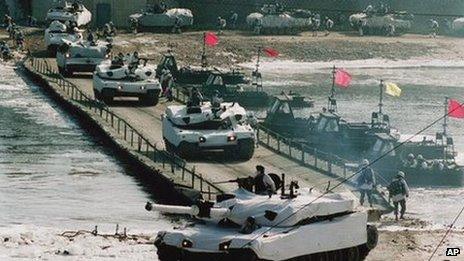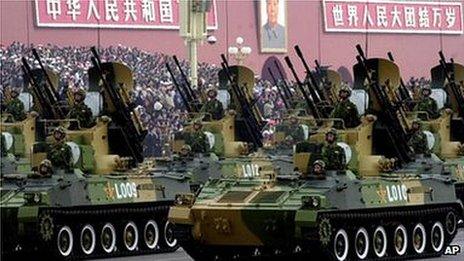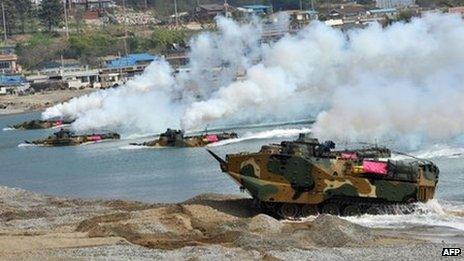Doomsday scenario plan would divide North Korea
- Published

South Korean army divisions are poised to fight at short notice along the DMZ
It sounds like a doomsday scenario drawn up by strategists at the height of the Cold War.
Chinese armies move south into the Korean peninsula and collide with American and South Korean forces moving north. The resulting clashes spark war between nuclear-armed superpowers.
A new report, external says such a confrontation is still a real danger in the event of a sudden collapse of the North Korean regime.
The report produced by the US research institute, the Rand Corporation, says that North Korea is a failing state that could fall apart at any moment.
It says agreement is urgently needed between Washington and Beijing on contingency plans - including setting up a temporary line of division inside North Korea to keep their armies apart.
East German-style collapse
Analysts have been predicting the imminent collapse of North Korea for the last two decades.
The regime has surprised many with its resilience; surviving two traumatic changes of leadership, sanctions over its nuclear programme and a famine that may have killed more than a million people.

Chinese armoured columns could drive on Pyongyang in the event of regime collapse
Despite that, the Rand Corporation insists that the North Korean system is extremely brittle and could collapse with little warning.
It cites endemic economic problems and food shortages - even allowing for current signs of growing prosperity in the capital, Pyongyang. It says the regime's ability to keep the population ignorant of the outside world is being rapidly eroded, and points to reports of discontent within the military - including rumours of assassination attempts against the leadership.
A senior South Korean official, speaking on condition of anonymity, said the government in Seoul was also deeply concerned about an abrupt collapse of North Korea - in the style of East Germany or the Soviet Union.
The official also stressed the need for credible contingency plans and more co-operation with China.
Flood of refugees
But the South Korean government is likely to be appalled by the proposal to give China a zone of control in North Korea - which it regards as sovereign Korean territory.
The Rand Corporation report says that China is likely to intervene militarily in North Korea in the event of a sudden breakdown of government there. The assassination of the leader Kim Jong-un is cited as a possible event that could lead to internal feuding and precipitate foreign intervention.
China would want to stem a flood of North Korean refugees across its border. It could also move to pre-empt the sudden appearance of American troops on its frontier - an event that has taken the two countries to war once before.
"Intent on trying to secure as much territory as possible, Chinese and ROK-US forces would eventually make contact and suffer accidents as the forces from the two sides come within range of each other," warns the report's author, military analyst Bruce Bennett.
"In some areas, forces could be bypassed by forward elements of the other side and find themselves in the other side's rear area. If conflict were to begin between the ROK-US forces and the Chinese forces, that conflict could escalate significantly in ways that neither side would want," the report says.

US and South Korean amphibious forces could strike deep into North Korea
Most South Koreans are unenthusiastic about sudden reunification, fearing the vast expense would derail their own economy.
Secure WMD
But an abrupt collapse would force the issue. South Korea has always claimed sovereignty over the whole Korean peninsula and has the backing of its American allies in the pursuit of eventual reunification.
Its army divisions strung out along the southern edge of the Demilitarised Zone (DMZ) could be expected to advance rapidly in the event of a political vacuum north of the line.
The troops would be tasked with tackling any remaining hostile elements of the North Korean military, feeding the population and establishing security. Special forces and airborne units would move ahead to secure weapons of mass destruction - including North Korea's nuclear and chemical programmes.
Chinese forces racing south from the Yalu River could be tasked with similar objectives.
Rand believes that rules and scenarios need to be agreed and discussed with China well in advance.
It is proposing negotiation on three potential lines to be drawn across the peninsula, making clear how far south Chinese forces would be allowed to penetrate.
One line would be just 50km (31 miles) from the Chinese border; the furthest would bisect the capital Pyongyang itself and another major city on the east coast, Wonsan.
China would be able to use the territory to stem refugee flows and establish a buffer against US forces - on an understanding that its occupation was temporary and that US forces would not seek to stay north of the existing DMZ.
Mistrust and suspicion
It sounds an unlikely scenario.
A further division of the peninsula would infuriate nationalists in South Korea, who feel their country's rising power as an economic force in the world.
China does not trust American intentions in Korea or anywhere else, complaining that Washington is already trying to contain it with a policy of encirclement from Mongolia to Vietnam.
Some South Koreans already suspect a Chinese plan to block reunification by annexing the north, or parts of it, and securing natural resources and ports on the Pacific for Beijing.
China has been unwilling to discuss any such scenarios so far, for fear of upsetting its Communist party allies in Pyongyang.
But diplomats say China has shown more signs of co-operation recently, even quietly helping some North Korean refugees seeking safe passage to the South.
Nationalist passions are running high in North-east Asia at the moment and hardliners in China may insist on a solid territorial buffer against feared American encroachment - at almost any cost.
However, pragmatists on all sides also have influence, arguing that contingency planning is essential for what could be a security nightmare at the heart of the world's most dynamic economic region.
North Korea may survive as a totalitarian anomaly for another two decades. But no-one in the neighbouring capitals can be confident that calamity won't strike next week.
- Published9 September 2013
- Published30 August 2013
- Published12 September 2013